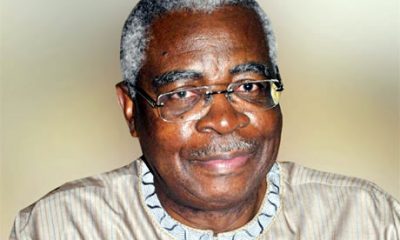BUSINESS
Baobab Microfinance Bank Launches New App to Boost Mobile Banking

As part of its effort to ensure its customers have easy access to their funds and carry out seamless transactions, Baobab Microfinance Bank has launched a new mobile app.
The bank in a statement said the mobile app known as MyBaobab will offer its customers a new banking experience, built on cutting-edge technology, with ease of usage and excellent customer experience.
According to the Managing Director / Chief Executive Officer Dr.
Kazeem Olarewanju, “our aim is to ensure our customers have access to their funds to carry out transactions while keeping safe at all times. In view of this, customers who use the new mobile app till the middle of February will be offered Free Transfer Fees.”“In delivering on our promise to continually enable our customers to unleash their potentials, we have continued to invest in technology to create value, and we developed MyBaobab mobile app to suit our customers’ lifestyle and meet their financial needs, ”he noted.
“Some of the unique features of the Mobile App include Bank to Bank transfers, Taka loan applications, loan repayment management, and lots more. My Baobab app allows customers to easily access their account with their smartphones. All they need to do is download the app and sign up. With this, they can perform various fund transfers, account inquiries, and check their loan status.”
“The App which is available on google play store, is designed to also prompt our customers on when next they will repay their loans, and for those who have accessed our Taka Loans, they can disburse their Taka loans through the mobile App.
“Baobab Microfinance Bank has continued to invest in technology to create value for customers and reach the unbanked with its digital transformation project. Presently, the e-payment channels deployed by the bank include USSD, with code *732*348#, and a Debit card for customer use. The bank has also partnered with Interswitch to deepen e-payment deployment and transactions via Quickteller channels, “he said.
BUSINESS
OPay Triumphs at Nigeria Technology Awards 2025

In a remarkable recognition of its commitment to innovation, trust, and customer service, OPay, Nigeria’s leading financial technology company, has been named Most Trusted Digital Bank of the Year and Customer Friendly Digital Bank of the Year at the Nigeria Technology Awards (NiTA) 2025.
The awards ceremony, held on Saturday, brought together top technology leaders, innovators, and organizations driving Nigeria’s digital transformation.
Now in its 11th edition, NiTA continues to recognize outstanding achievements across the country’s technology ecosystem, celebrating organizations that deliver measurable impact and set new benchmarks in digital innovation.Speaking after receiving the awards, Ibukun Humphery Oluwagbenga, Head, IT Support and Operations at OPay, said: “Being named Most Trusted Digital Bank and Customer Friendly Digital Bank at NiTA 2025 is a testament to our unrivalled commitment to our customers. Every product, service and innovation we deliver is focused on building trust, simplifying digital banking, and ensuring that users can transact safely and confidently. This recognition belongs to our dedicated team and the millions of Nigerians who inspire us to continually raise the standard for digital banking.”
“We are proud to receive these two prestigious awards, which reinforce OPay’s mission to provide not only secure but highly accessible and customer-friendly digital banking services. These awards celebrate our ongoing dedication to trust and reliability.”
OPay’s dual wins at NiTA 2025 reflect the company’s sustained efforts in expanding digital financial inclusion across Nigeria. Beyond its technological innovations, OPay has actively promoted financial literacy, customer support excellence, and community engagement, ensuring that users are equipped with the knowledge and tools to transact safely. This approach has not only strengthened customer trust but also contributed to the company’s reputation as one of the most reliable and user-friendly digital banks in Nigeria.
About OPay
OPay was established in 2018 as a leading financial institution in Nigeria with the mission to make financial services more inclusive through technology. The company offers a wide range of payment services, including money transfer, bill payment, card service, airtime and data purchase, and merchant payments, among others.
Renowned for its fast and reliable network and strong security features that protect Customer’s funds, OPay is licensed by the CBN and insured by the NDIC with the same insurance coverage as commercial banks.
BUSINESS
NGX Says Reforms Set to Strengthen Nigeria’s Investment Climate

Chairman, Nigerian Exchange Group (NGX), Dr Umaru Kwairanga, said ongoing regulatory reforms are positioning țhe nation’s capital market to attract more investments and boost investor confidence.
Kwairanga was quoted in a statement on Sunday in Lagos to have said this during the ongoing 2025 Capital Market Correspondents Association of Nigeria (CAMCAN) Workshop.
The workshop had the heme, “Regulatory Reforms: ISA 2025 and Nigeria’s Investment Climate.
”The NGX Chairman noted that the Investment and Securities Act (ISA) 2025 marked a major step in improving market governance and investor protection.
According to him, the reforms represented structural changes aimed at modernising the market and attracting deeper investment flows.
“With the recent reforms encapsulated in the Investment and Securities Act (ISA) 2025, Nigeria has entered a pivotal phase in strengthening market governance, boosting investor protection, and enhancing overall market competitiveness.
“These reforms are not merely regulatory updates; they are foundational shifts designed to modernise our capital market architecture, attract deeper pools of capital, and position Nigeria as a top-tier investment destination within Africa and globally.
“As we navigate the complexities and opportunities presented by these reforms, your role as market media stakeholders becomes even more critical,” he said.
He said that the Exchange remained committed to supporting reforms that deepen transparency and broaden market participation.
He highlighted NGX Invest as a major innovation designed to simplify public offers and rights issues through digital channels.
Kwairanga said the platform had enabled millions of investors to participate directly in capital-raising activities.
He explained that NGX Invest had improved transparency, strengthened compliance and enhanced efficiency within the primary market.
Kwairanga said these efforts aligned with ISA 2025, which prioritises digital inclusion, operational efficiency and improved investor confidence.
“None of these efforts can thrive without credible and informed communication, and this is where the members of CAMCAN, remain indispensable.
“As journalists and correspondents covering the capital market, you act as a bridge between policy, market activity, and the investing public.
“Your work ensures that reforms are understood, market developments are accurately reported, and public trust is maintained. In a world increasingly challenged by misinformation, your role in delivering timely, factual, and contextual reporting is more vital than ever.
“I therefore charge you to continue upholding the highest standards of professionalism, accuracy and integrity.
“Your contributions help shape investor perception, support regulatory transparency, and ultimately strengthen the Nigerian capital market,” he said.
BUSINESS
Afreximbank Seeks Digital Innovation to Unlock Nigeria’s Trade Potential

The African Export-Import Bank (Afreximbank) said digital transformation is critical to unlocking trade and investment potential under the African Continental Free Trade Area (AfCFTA).
Dr Yemi Kale, Group Chief Economist and Managing Director, Research, Afreximbank, stated this at an engagement event on “Unlocking Nigeria’s Trade and Investment Potential Through Digital Innovation and the Abuja Africa Trade Centre (AATC)” on Thursday in Abuja.
Kale said the AfCFTA had created the world’s largest new trading bloc, representing a unified market of over 1.
3 billion people and a combined GDP of more than 3.4 trillion dollars.“This integration goes beyond a symbolic milestone.
“It is a strategic platform capable of redefining how African economies produce, trade and compete in a rapidly changing global economy,” he said.
He noted that regional integration presented a once-in-a-generation opportunity to expand value chains, reduce dependence on primary commodities, accelerate industrialisation and strengthen Africa’s position in global markets.
Kale, however, expressed concern that intra-African trade still averages between 15 and 18 per cent, compared with 60 per cent in Europe and 40 per cent in Asia.
He identified market fragmentation, high logistics costs, gaps in trade data and cross-border payment challenges as factors limiting trade growth across the continent.
“If Africa must rise to its true economic stature, we must confront these obstacles with clarity, urgency and innovation.
“We must do so using one of the most powerful accelerators available to us and that is digital transformation.”
He explained that digital technologies such as end-to-end supply chain systems, automated customs services, e-commerce platforms, AI-driven market intelligence and digital payments were changing the structure of global trade.
Kale cited Rwanda’s digital single-window model and the growth of mobile money platforms as evidence of successful innovation
He noted that Afreximbank’s Pan-African Payment and Settlement System (PAPSS) was projected to save the continent billions in currency conversion costs.
According to him, digital innovation supports small and medium-sized businesses, including young entrepreneurs who can now access wider markets using online platforms.
He said that Nigeria’s large youth population gave the country a strategic advantage to lead Africa’s next phase of digitally-enabled trade.
“With 65 per cent of Nigeria’s population under 25, our young innovators are creating solutions, founding start-ups and shaping new industries.
“Strengthening skills, regulation, finance and collaboration will accelerate this impact,” he said.
He said Afreximbank was supporting this growth through the African Trade Gateway (ATG), trade intelligence services, and the AfCFTA Adjustment Fund among other initiatives.
“The ATG integrates trade information, due diligence, secure payments, and market insights, which are precisely the tools required for African businesses to compete effectively in an integrated continental market.
“It is, therefore, encouraging that Nigeria has taken a leadership role in advancing these priorities.”
Kale added that the Abuja Afreximbank Africa Trade Centre (AATC) represented the bank’s commitment to modernise trade by providing facilities that integrate information services, exhibition spaces, a business hotel and access to digital trade tools.
According to him, the centre is the first in a network of one-stop trade hubs being developed across Africa and the diaspora.
Kale said the AATC would help businesses access financing, partners, market intelligence, logistics support and technology services within a single space, reducing barriers and transaction costs.
“This building is more than a physical structure. It represents a catalytic platform for integration, innovation and investment,” he said.
He urged stakeholders to work together to drive digital transformation and build a continent where entrepreneurs can compete globally.
“This is not a distant dream. It is a future within our reach if we embrace innovation and collaboration,” he said.
Participants at the event were shown a live demonstration of Afreximbank’s Trade Intelligence Solutions- ATG and TRADAR and explored the role of AATCs in promoting trade and investment.
The event brought together financial institutions, trade organisations, investors and business owners.




















